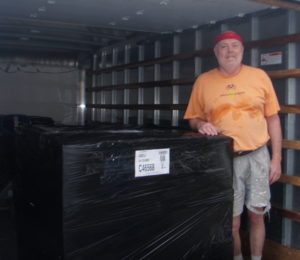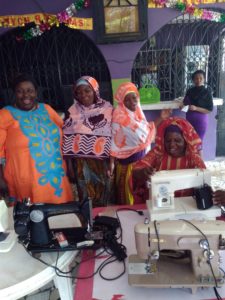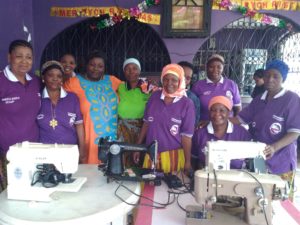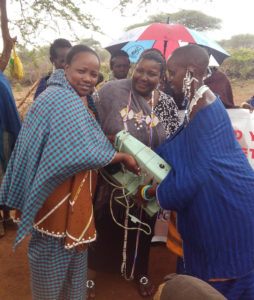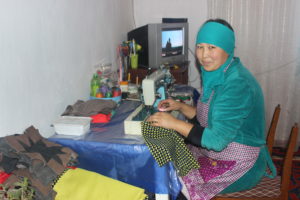
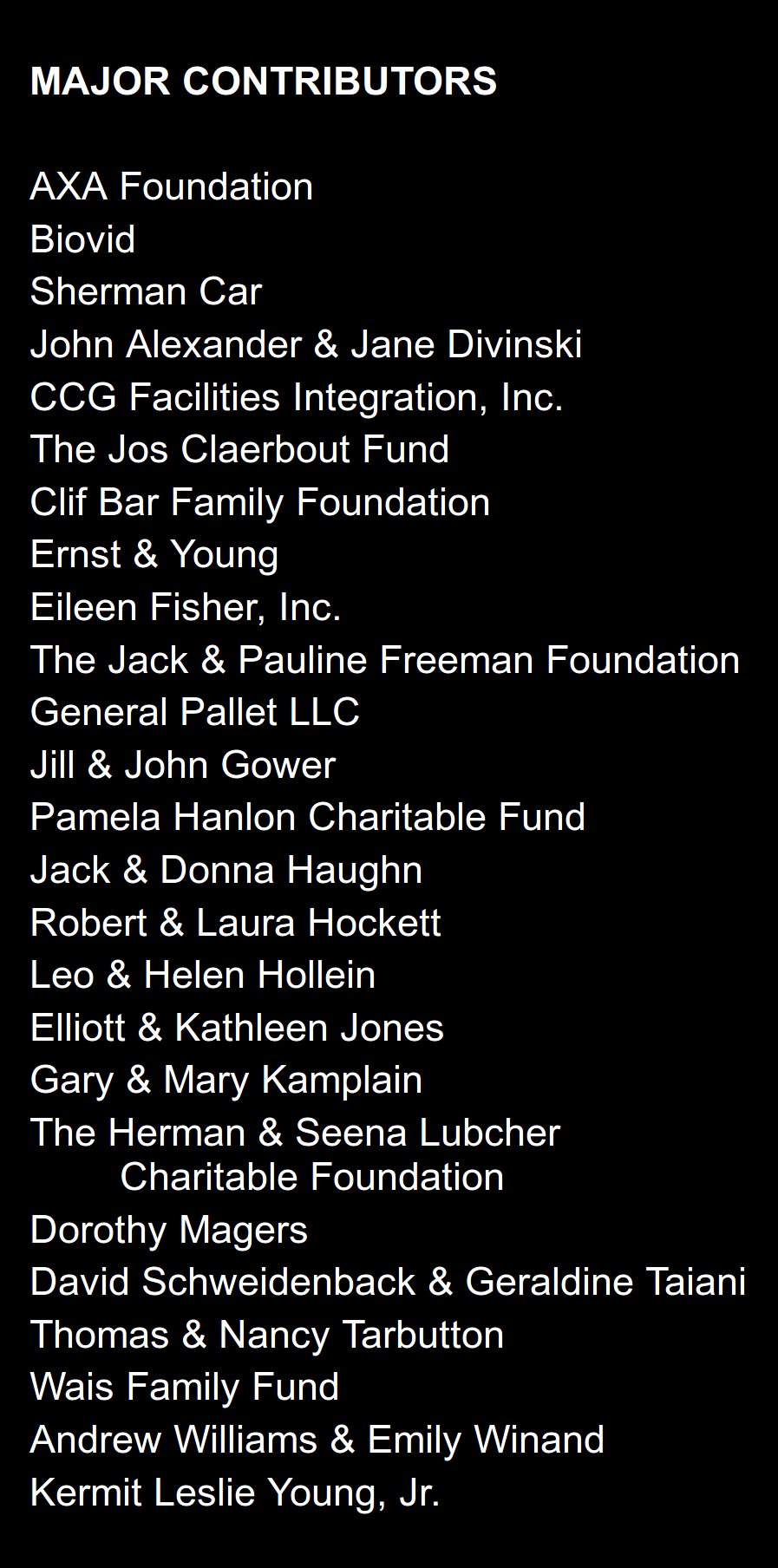
President’s Letter, Summer 2017
Dear Friends of P4P & SP,
Welcome to our first digital newsletter! With this format we can bring you much more information because we’re not constrained to a set number of pages. We will also save the significant cost of postage, which we can then use for our core mission of collecting and shipping income-generating potential around the world.
150,000 bikes shipped! That sure is a lot of opportunity for a heck of a lot of people, and let’s not forget the 3,700+ sewing machines we have distributed worldwide. We remain true to our original mission of proper recycling here in the U.S. for the benefit of motivated people worldwide who want a better life and are willing to work for it.
We should also give a shout out to our most amazing partners overseas, for it is those overseas partners who are responsible for the distribution. They are also responsible for finding and writing these incredible success stories that we bring you in our newsletters. We have always felt that it is important that we supply firsthand accurate stories to you the supporters of P4P so you can judge the effectiveness of our programs.
Now 26 years old, P4P has survived many turns up and down in the economy, but we have managed to stay in business because of your support. We have also managed to stay in business because of the incredible staff, some of whom right now as I write this on a Saturday in May, are standing out in the pouring rain processing bicycles. And next weekend they will be in a steel container packing those bicycles in 100º heat! P4P puts an incredible amount of sweat equity into every shipment. From Granby, Connecticut, to Gettysburg, Pennsylvania, and from Westchester, New York, down to Middletown, Delaware, our staff covers a very large domestic footprint on a shoestring budget. It is always hard physical work moving tons of bicycles but Gary always seems to do it with a smile.
I hope you enjoy both InGear and InStitch. These stories certainly inspire us to work a little harder pushing production higher so that we can offer opportunity to an increasing number of people every year.
Sincerely,
David Schweidenback
Report from Tanzania
Summer 2017 InStitch
Introduction
The Honorable Sophia Mwakagenda is a Member of the Parliament of Tanzania. From 1 April 2016 to 20 March 2017 the Honorable Mwakagenda visited different constituencies of the Longido and Ngorongoro districts in the Arusha region, and the districts of Rungwe, Kyela, Mbarali, and Mbeya in the Mbeya region. This visit was a continuation of visits countrywide in order to listen to the people and implement some of her programs through her NGO She Can Foundation.
The visits in Mbeya and Arusha regions were coordinated by the Office of Members of Parliament located in Mbeya city.
Honorable Mwakagenda was accompanied by a team of 4 researchers and assistants: Edwin Mwaitebele, Emmanuel Ngwetta, Mpegwa Mwakang’ata, and Frank Kayumba.
The Purpose of the Visit
The purpose of the visit was to help women’s entrepreneur groups by giving them means of production, like sewing machines, to improve their productivity in their local settings.
Specific Objectives
- To meet women’s social and economic groups in different areas to hand over support and equipment including sewing machines
- To provide some knowledge and skills to these groups
Activities
The team met six women’s social and economic groups from seven constituencies of Arusha and Mbeya regions with the aim of sharing with them knowledge and skills on entrepreneurship for them to improve their work. The MPs handed over sewing machines during this visit. In Mbeya region and Arusha region, which is Masaai, the MPs handed over a total of 61 sewing machines.
The Honorable Mwakagenda gave four sewing machines to women’s entrepreneur groups in Mbeya urban constituencies.
In her visit of 17 and 18 March to the Longido district of Arusha region, Honorable Mwakagenda gave a sewing machine to a 21-year-old woman known as Grace from the Ngarenaibo village. The machine gives Grace employment and should improve her family’s economic situation.
Numbers of Sewing Machines Given
From 1 April 2016 to 23 March 2017, Honorable Sophia Mwakagenda gave 73 sewing machines as follows in Mbeya and Arusha regions.
| REGION (District) | NUMBER OF MACHINES |
|---|---|
|
|
|
| MBEYA (Kyela, Rungwe, Mbarali, and Mbeya) | 36 |
| ARUSHA (Longido and Ngorongoro) | 37 |
|
|
|
| TOTAL | 73 |
Other Activities
Honorable Sophia Mwakagenda had an opportunity to visit Ngorongoro Crater, which is an international tourist attraction in Ngorongoro district and talked with the leadership concerning their challenges in their day to day work.
Honorable Mwakagenda also visited her fellow MP Honorable Cecilia Pareso in Karatu district to console her on her brother’s death, which happened few days ago.
Reflections on the Visits
Honorable Mwakagenda and her team got a good reception from the leadership and citizenry in general.
The level of awareness of the people, particularly women, in attending, listening and participating to the Member of Parliament meetings was very high.
These visits give people hope: the visits show love and togetherness in society regardless of location, tribe, background, status, and colour.
Sewing in Kenya
Summer 2017 InStitch
Cherehani Africa provides sewing machines to women in rural Kenya to enable them to start and run their own independent tailoring businesses. Lillian Onyango lives and works in Madiany market, Siaya County. Lillian has four children, three of whom go to school. Lillian learned dress-making skills at Ruma Training Institute in 2010 but has been unable to afford to purchase her own sewing machine to enable her to start her own tailoring business. For the last seven years Lilian has been leasing a sewing machine to enable her to generate income and provide for her children.
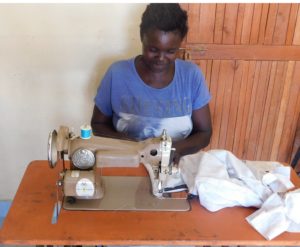 She pays a monthly leasing fee of $5, and this fee reduced her profits and chances of ever owning her own machine. When Cherehani Africa met Lilian and told her about our partnership with Sewing Peace that will enable her and many more women in rural Siaya to acquire sewing machines, she was overwhelmed with joy. For her, the sewing machine she has received from Sewing Peace is the first production tool she owns in her own name. Lilian made a down payment of $40 for the sewing machine and committed to completing the deficit of $20 in two months. Lilian no longer has to lease a sewing machine and is able to take home more money to support her family. Through the partnership of Cherehani Africa and Sewing Peace, Lillian no longer has to worry about leasing a tool she depends on for her survival. All her energy and savings are now directed at completing the payment for the sewing machine. “Thank you Sewing Peace for enabling me own a sewing machine. I will work very hard to ensure that you can extend your support to many more women like me in Kenya,” says Lilian.
She pays a monthly leasing fee of $5, and this fee reduced her profits and chances of ever owning her own machine. When Cherehani Africa met Lilian and told her about our partnership with Sewing Peace that will enable her and many more women in rural Siaya to acquire sewing machines, she was overwhelmed with joy. For her, the sewing machine she has received from Sewing Peace is the first production tool she owns in her own name. Lilian made a down payment of $40 for the sewing machine and committed to completing the deficit of $20 in two months. Lilian no longer has to lease a sewing machine and is able to take home more money to support her family. Through the partnership of Cherehani Africa and Sewing Peace, Lillian no longer has to worry about leasing a tool she depends on for her survival. All her energy and savings are now directed at completing the payment for the sewing machine. “Thank you Sewing Peace for enabling me own a sewing machine. I will work very hard to ensure that you can extend your support to many more women like me in Kenya,” says Lilian.
Hello David,
The total cost for the machine is $60, which most beneficiaries pay off in six monthly installments of $10. All the machines that we received were in merchantable condition and we have not had to repair any before issuing. We broadly put the machines into two categories: those that could be converted to manual ($60) and those that are strictly electrical ($80). The ones that could be converted to manual have been widely issued as most beneficiaries work in stations without electricity. The electric ones have moved slower because they are more suitable for urban centers.
Best Regards,
Robert Mboya
Kyrgyzstan Sewing Update
Summer 2017 InStitch
Of the 30 sewing machines received, 23 have been repaired. These machines have greatly improved the lives of our beneficiaries, helping give low-income families in our region a way to earn valuable income for their families. Because many of our beneficiaries are single parents, our beneficiaries use them to run businesses out of their homes, allowing them to care for their children while working. In order to make our work sustainable, we are always looking for ways to support our beneficiaries in finding long-term solutions to issues that they are experiencing. Your donation of sewing machines has helped us do just that. Thanks for your support!
Family Narratives
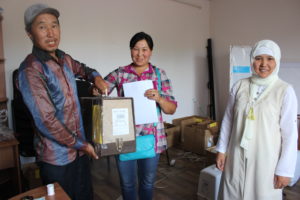 “When we first applied for assistance from the Family Strengthening Project (FSP) my family was in a very difficult situation. Our family had practically no income, and we had extreme difficulty feeding our children. Thanks to FSP and their partnership with Sewing Peace, I had the opportunity to take sewing courses and receive state certification and started a sewing business with three other families in January 2017. Our business has received two sewing machines, and we are already taking orders and sewing products for an upcoming wedding.
“When we first applied for assistance from the Family Strengthening Project (FSP) my family was in a very difficult situation. Our family had practically no income, and we had extreme difficulty feeding our children. Thanks to FSP and their partnership with Sewing Peace, I had the opportunity to take sewing courses and receive state certification and started a sewing business with three other families in January 2017. Our business has received two sewing machines, and we are already taking orders and sewing products for an upcoming wedding.
We are very thankful for the generous donation life-changing support from Sewing Peace.”
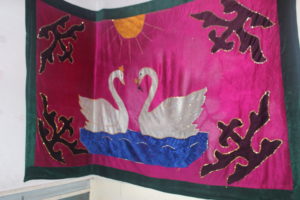
“I am the mother of five children, and did not have enough income to care for them well. I have been an FSP beneficiary for a year, and they have provided me with necessary material and psychological support. But I was still in need of a job to provide long-term, steady income for my family. Because of the donation from Sewing Peace, I was given a sewing machine to start a business from my home. Already, I have received and fulfilled many orders using this machine.
Aside from providing work for me, this sewing machine has allowed me to sew necessary items for my family. Because of this donation, I am better able to care for my family. Thank you for your donation and for how you supported my family through a very difficult time.”
The Sewing Machine
Summer 2017 InStitch
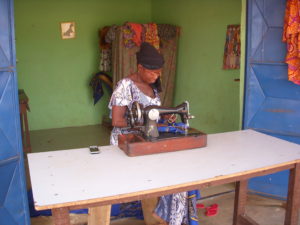
Sewing may generally be described as an art whereby stitches and seams are used to join two or more fabrics together. Depending on their creativity and imagination, seamstresses and tailors design and sew clothing so that people will look extremely beautiful in it when they wear it.
Since sewing machines seem expensive to young people from relatively needy families, they find it difficult to get one on their own when they want to engage or enroll into such a vocation or profession. Fortunately, this problem has been curbed in some areas in Ghana due to help from WEBike.
The machine is bought at a rather cheap price. This enables young people to learn the vocation and establish their own businesses easily, and then to train other people in that field and engage the employment of other younger generations who are interested in sewing and designing. This has helped to reduce marginally the unemployment rate.
A sewing job also keeps young and energetic people away from dangerous and sometimes criminal behavior. They prefer the vocation to such negative vices.
Economically, it has also helped them to take care of themselves and families as well, especially in the area of education from basic to tertiary.
We are so grateful to the WEBike organization for their help and support.

